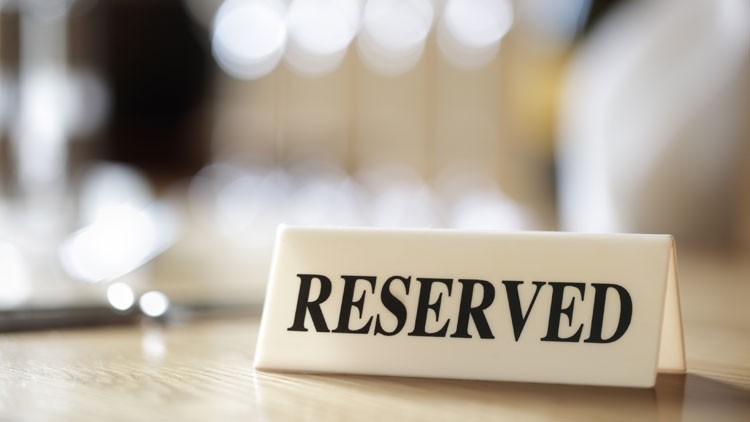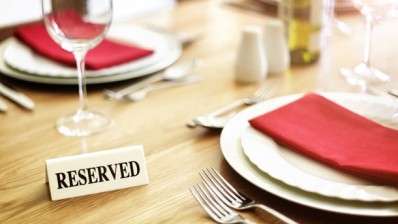Irish restaurant association calls for members to crack down on no-shows

Speaking to Irish radio show Newstalk Breakfast, chief executive Adrian Cummins said that the RAI was advising its restaurant members to put in place a policy that they take a credit card deposit for tables of four or more and charge it if customers do no give enough notice if they want to cancel or if they fail to make their booking.
“Over the last number of years we’ve seen a marked increase in the number of no-shows in our industry,” he said. “People are booking tables for four or more and not turning up, which has a detrimental effect on my members and restaurants across the country.”
Cummins said it was up to the individual restaurants to decide how much of a deposit to take and to set a cancellation period, but recommended it should be around 24-48 hours notice. The average price of a deposit in the sector was 20 Euros (£17.60), he said.
“You have to give a restaurant advance notice. They have brought in staff and product so they need some sort of notice. We will not dictate what that notice is, it is up to them how they implement the policy."
Defending the move, Cummins compared the restaurant sector to other leisure and hospitality industries where full payment up front or a deposit was the norm.
“If you compare our industry to booking tickets for a concert or a cinema or for a hotel it’s exactly the same. Our industry needs to do something about this. Our members have been calling for us to advise on this sector to bring in a policy that stamps out no shows.”
The issue of no-shows is clearly on the RAI’s agenda for this year. In his report for January, RAI president Liam Edwards wrote: “Let’s hope there were more shows than no shows!
"We will tackle this issue head on before Christmas comes around again.”
Dealing with no-shows
The topic of no shows has long been a thorny one in the restaurant industry, with restaurateurs taking a number of steps in recent years to try and limit them.
The rise in no-reservation restaurants over the past few years has partly been down to restaurants wanting to move away from the traditional booking model and the potential for no-shows, although this approach is often only effective in areas of high-footfall.
More recently, restaurants are starting to combine their approach so that they have some dining room space that cannot be reserved, for walk-ins, as well as bookable tables.
A number of fine dining restaurants have also adopted a pre-pay system in order to eradicate no-shows. The Clove Club in Shoreditch was the first UK restaurant to adopt the Tock system, whereby customers pay for their food and wine in advance and pay for any extras at the time. Tickets are non refundable but they can be moved.
The Clove Club says that since the introduction of Tock, not only have the no-shows been eradicated but having a clear picture of how many diners are guaranteed on any given day has allowed it to keep its costs down and dramatically reduce wastage.
The Fat Duck in Bray also introduced a pre-pay booking system when it reopened after its refurbishment.
Restaurateurs are divided, however, on whether or not to take a non-refundable deposit. Many fine dining restaurants have been forced to implement a reservation policy because of the problem with no-shows.
Restaurant Sat Bains in Nottingham, for example, asks guests to provide 72 hours’ notice is given by noon prior the booking date should they wish to cancel or amend the number within your party. Failure to do so incurs a £95 charge per person - but if the restaurant is able to resell the table to a group of the same size it will refund the full amount.
The restaurant also requires five days’ notice for its Chef’s Table, Kitchen Bench and Nucleus, with a charge of £130 per person - but will again attempt to resell the table.
Speaking at a recent Restaurant magazine round table, Raz Helalat, owner of The Coal Shed restaurants in London and Brighton, said that he can have around 20-30 no shows on a Saturday night but that he didn’t take a deposit unless for large groups.
By contrast, new-wave Indian restaurant group Kricket takes a deposit for tables of four or more and has a 24-hour cancellation policy. “You have got to use common sense," says co-founder Rik Campbell.
“It stops people from cancelling. Customers get an email 36 hours before, then we also call 24 hours before to confirm it, so there’s not really an excuse to not turn up unless something drastic has happened.”
Campbell says the policy has dramatically cut no shows at Kricket in Soho, with only 25 no-shows out of 6,000 in a recent count.
Other restaurateurs argue that taking a deposit could deter customers and is a risk they are so far not prepared to take.
“If you’re a restaurant that concentrates on regulars, that’s when it gets very difficult to introduce penalties,” says James Lewis, creative development and marketing at Gauthier Soho. “You have to allow for life.
“I’d be so terrified that the minute you charged that person you’d never see them again.”






























